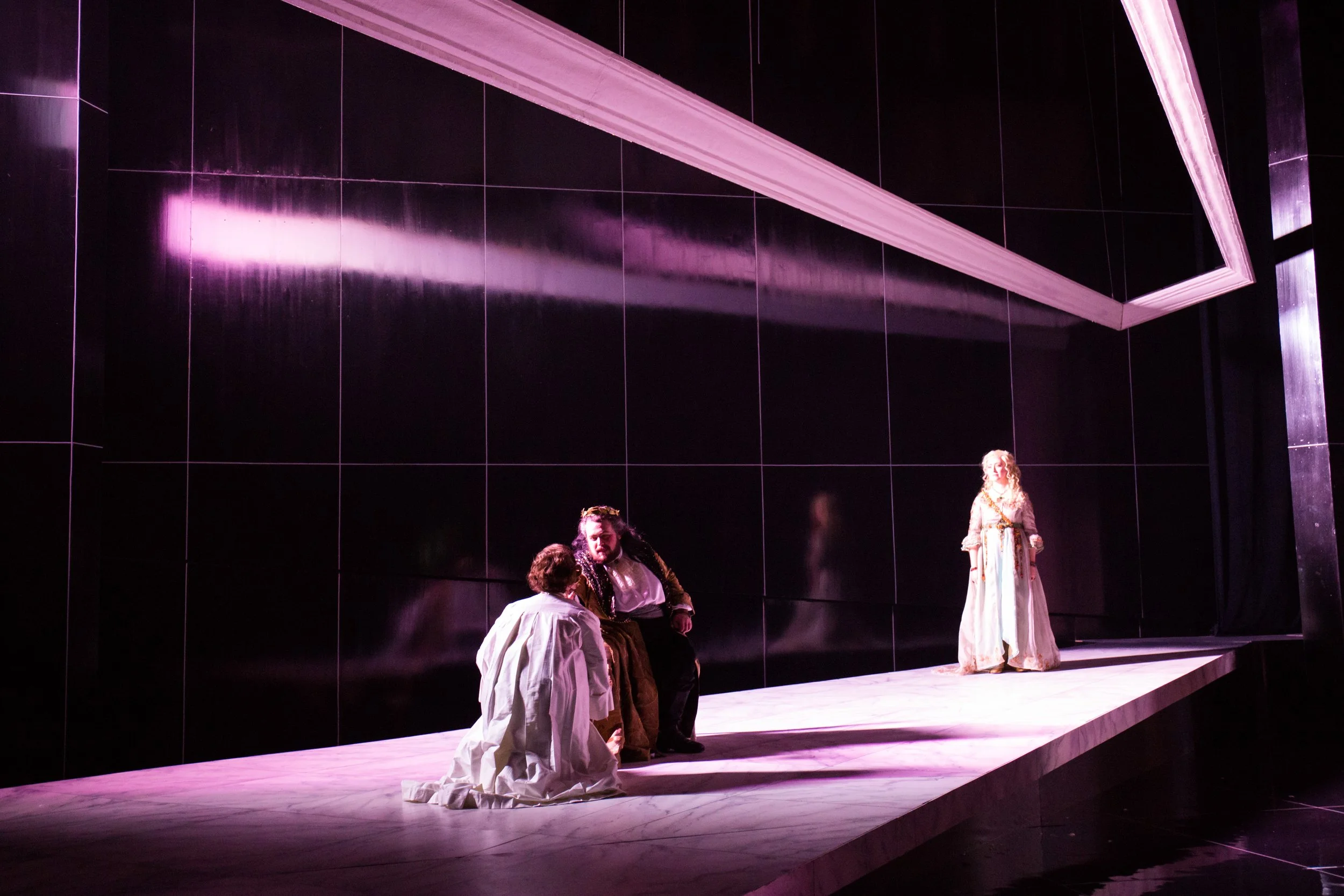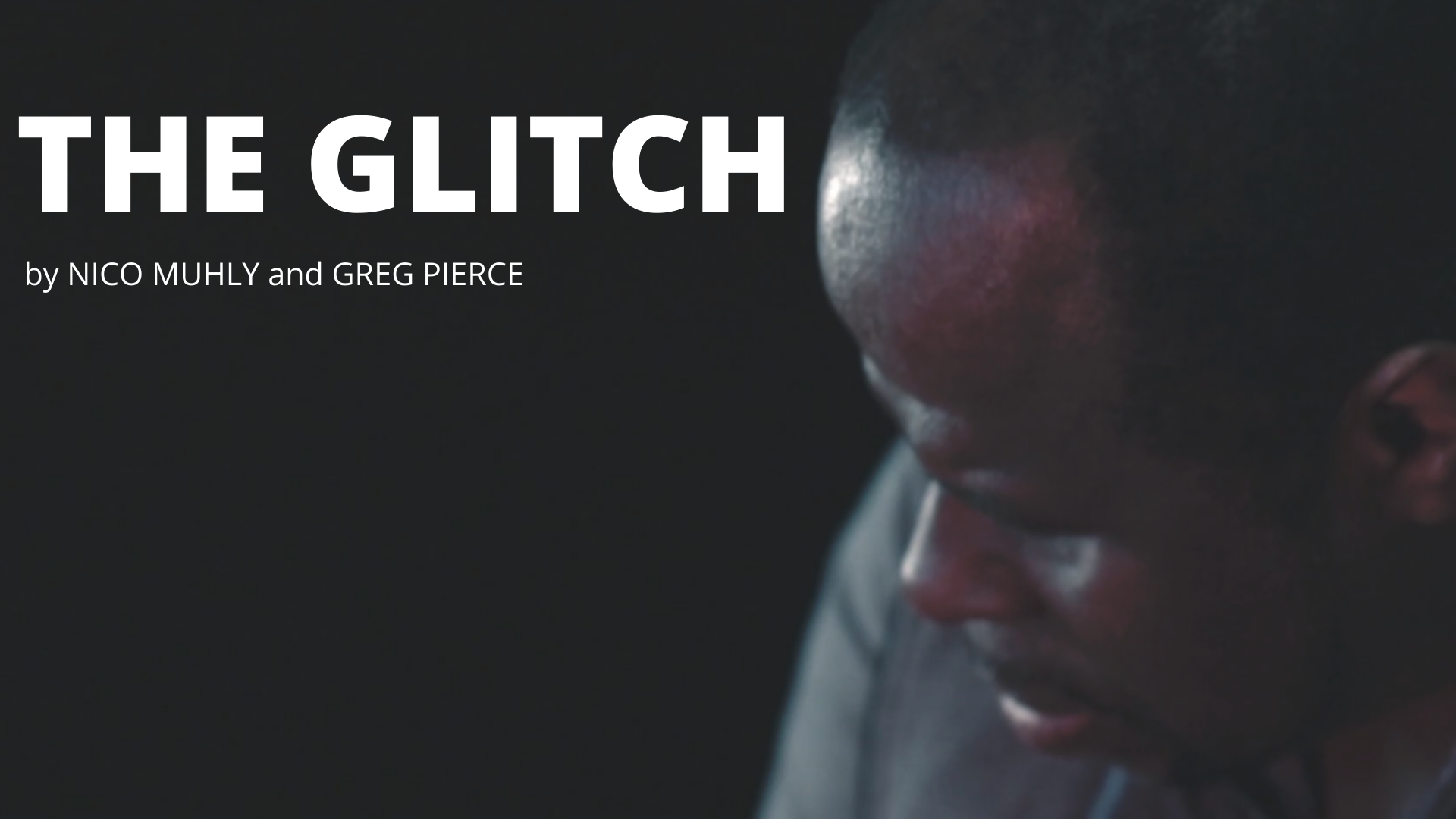IDOMENEO | CCM
REVIEW: MOZART’S ‘IDOMENEO’ A RARE TREAT AT CCM
“A superb cast of singers reigned over a striking new production of Mozart’s opera “Idomeneo,” which opened Thursday in Patricia Corbett Theater at the University of Cincinnati College-Conservatory of Music.
...
CM’s abstract, minimalist production, staged by Marcus Shields and conducted by CCM faculty member Aik Khai Pung, offered many rewards. Matthew Hamel’s inventive set design was basically a shiny black box, dominated by a sloped ramp that crossed to the front of the stage, where much of the action took place. An abstract crown molding and a single crystal chandelier floated overhead.
Midway through Act I, the back wall parted to reveal a representation of the churning sea – a draped and tied fabric installation, which was transformed by lighting (Oliver Tidwell Littleton).
—-
Shields’ staging was effective for the smallish stage, particularly in moments when the action froze. One of the most ravishing moments was in Act III, as Ilia sang of gentle breezes while blossoms fell, and Idamante stood in the background. The sea monster didn’t materialize. However, the tableau of the townspeople transfixed with fear told the whole story.
”
— JANELLE GELFAND
Bernstein’s MASS | CINCINNATI SYMPHONY ORCHESTRA
REVIEW: Bernstein’s ‘Mass’ an over-the-top ‘happening’ at May Festival
“At the height of the Celebrant’s breakdown in Leonard Bernstein’s “Mass,” the congregation trashed the altar, shredded flowers, guzzled wine and groveled on the stage. The May Festival Chorus did a kind of striptease of their choir robes, throwing them to the floor.
The Celebrant, who also shed his own vestments, shrieked “Pacem!” as he threw down the large cross monstrance, and the decibel level in Music Hall grew to a din.
The creative team – including stage director Marcus Shields, scenic designer Frank Oliva and Greta Stokes, who designed the costumes – placed the period somewhere in a middle ground.
The singers had terrific stage presence. One of the most memorable performances was Robert Lomax’s Preacher in the humorous “God said: Let there be light.” They were inventively staged by Shields, with choreography by CCM’s Katie Johannigman.
At the center of the work, Kevin Vortmann’s performance in the demanding role of the Celebrant was a tour de force. His opening hymn, “A Simple Song” to guitar strumming, was earnestly sung with a warm, pure tenor. After his extensive crackup near the end, the song returned as “Secret Song,” in a reaffirmation of faith.
Boy soprano Mischa Sella movingly brought the work full circle in “Secret Song,” accompanied by his mother, CSO harpist Gillian Benet-Sella.
The sold-out crowd gave it a lengthy ovation. One concertgoer summed it up: “It was a happening.” ”
— JANELLE GELFAND
THE GLITCH | CATAPULT OPERA
REVIEW: WALL STREET JOURNAL
Catapult Opera, founded by the conductor Neal Goren (formerly head of the now-defunct Gotham Chamber Opera), had planned to present its first-ever season live in 2020-21. Foiled by Covid-19, the company instead launched a digital commissioning program. The first result is “The Glitch,” a 22-minute, two-character opera by composer Nico Muhly and librettist Greg Pierce. As filmed by director Marcus Shields, performed by baritone Lester Lynch and soprano Krysty Swann, and conducted by Mr. Goren, the piece powerfully demonstrates how the small screen can make opera—often the grandest of art forms—truly intimate.
Mr. Pierce’s trenchant libretto drills deep into the couple’s questions for each other and themselves, their motives and their bond. “How could you? Who are you?” Lyle asks. Tilly’s response, a romantic fantasy about the prisoner Richie and a dream of escape from everyday life, turns darker with her realization that Richie, a convicted murderer, might well have abandoned or killed her while they were on the lam. Lyle answers her erotic taunting with an invented dalliance of his own that Tilly knows almost instantly is a lie. And even though Tilly suggests that killing Lyle (whom the conspirators called the “glitch” in the plan) was her idea, not Richie’s, and that she wants to be rid of him even now, he insists that he will stand by her.
“The Glitch” delves so skillfully into the immediate emotional reality of these two people that you don’t even need to know the background. Mr. Muhly’s lyrical vocal settings and atmospheric piano accompaniment performed by Adam Tendler feel like natural expressions of emotion, be they rapturous imaginings or angry confusion. The singers are filmed with darkness around them, as if they are alone in the void with their feelings and each other; Mr. Shields astutely often shows the reacting partner instead of the singing one, so we hear the words and see their effect. The intensity of the voices—Mr. Lynch’s opulent baritone and Ms. Swann’s wiry mezzo—and both singers’ remarkable ability to act with their faces are such that their performances never seem oversized or artificial on the small screen. Instead, we are drawn into their worlds. The real power of opera is less in its grandeur than in its ability to express the otherwise inexpressible; “The Glitch” does that with extraordinary grace.
“The Glitch,” … powerfully demonstrates how the small screen can make opera—often the grandest of art forms—truly intimate.
about CATAPULT OPERA
NYTIMES: A New Company Rises From the Ashes of Gotham Chamber Opera | MICHAEL COOPER
OPERAWIRE: Catapult Opera Launches New Initiatives to Re-Imagine Opera for Future | DAVID SALAZAR


